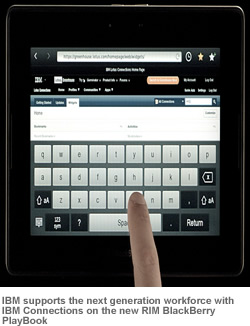
IBM Embraces Social Business
IBM today announced a new initiative to help organizations become social businesses with support for smart phones and cloud delivery models.
The company is introducing new software, services and programs that will help organizations integrate social networking concepts into business processes to accelerate collaboration, generate new ideas faster, and enable a more effective workforce.
 A shift is occurring in the enterprise. The adoption of social software is rapidly becoming a vital business tool, enabling organizations to transform virtually every part of their business operations from marketing, customer service and sales, to product development and human resources. Social business offers the world of possibility that occurs when all of the energy and opportunities that have been generated around consumer models, such as Facebook and Twitter, are focused, and brought to bear on business challenges.
A shift is occurring in the enterprise. The adoption of social software is rapidly becoming a vital business tool, enabling organizations to transform virtually every part of their business operations from marketing, customer service and sales, to product development and human resources. Social business offers the world of possibility that occurs when all of the energy and opportunities that have been generated around consumer models, such as Facebook and Twitter, are focused, and brought to bear on business challenges.
Whether accessing applications on premise, from a mobile device, or in the cloud, social businesses of all sizes need to communicate and collaborate on the fly across a global network of clients, partners and employees. To enable a social business, IBM is announcing:
* New software to help organizations socially enable their business processes using the most successful mobile devices, including tablets, such as RIM's BlackBerry and PlayBook, iPad, iPhone, Google Android, and Nokia devices
* New software and services to help businesses embrace the social business models through cloud computing, including a technology preview of IBM's cloud-based office productivity suite
* The plans for the next release of IBM's social software portfolio to enable social business, including a social business framework for software developers.
With the burgeoning mobile workforce expected to reach more than $1.19 billion by 2013, the need to help clients collaborate on the fly is growing. By bringing social business to the broadest range of mobile devices, IBM is enabling the next-generation workforce to collaborate beyond email to include instant messaging, Web meetings, and social functions such as blogs, wikis communities and activity streams.
 IBM also introduced its intention to extend its social software portfolio to the most successful mobile devices, including tablets, such as RIM's BlackBerry and Playbook, iPad, iPhone, Google Android and Nokia devices. For example, on these platforms IBM announced its plans to release new Lotus Sametime instant messaging clients, a social client for Activity Streams and extended its support for new mobile devices in the cloud.
IBM also introduced its intention to extend its social software portfolio to the most successful mobile devices, including tablets, such as RIM's BlackBerry and Playbook, iPad, iPhone, Google Android and Nokia devices. For example, on these platforms IBM announced its plans to release new Lotus Sametime instant messaging clients, a social client for Activity Streams and extended its support for new mobile devices in the cloud.
The adoption of cloud computing is on the rise as companies look to adopt new delivery models to improve efficiencies in their organizations. With this rising interest and adoption, IBM today announced it intends to offer a cloud-based version of LotusLive Symphony, an office productivity suite that will give organizations a social platform that enables them to simultaneously collaborate on documents in the cloud.
What sets LotusLive Symphony apart in the industry is its tight integration with IBM's social business cloud service, LotusLive. This helps organizations easily come together whether authors of a document are inside or outside the firewall. LotusLive Symphony authors will be able to co-edit documents in real time or work privately, store and share documents in LotusLive, comment, chat and manage revisions with other authors in real time, and assign and manage sections and tasks across multiple authors. Currently available as a technology preview at www.lotuslive.com/symphony, LotusLive Symphony is expected to become generally available in the second half of 2011.
LotusLive Symphony in the cloud complements IBM's free of charge, office productivity suite, IBM Lotus Symphony.
Further accelerating open standards in emerging markets, IBM today also introduced new software distribution partners, Red Flag Linux, GreatWall PC, and Archos, who are leading with IBM Lotus Symphony in emerging markets and around the globe. Archos is shipping its ARCHOS 9 PCtablet preloaded with Lotus Symphony. Embracing this market dynamic, Red Flag Linux and GreatWall PC, both headquartered in China, are bundling Lotus Symphony when distributing the Linux operating system to their clients. In fact, Great Wall will distribute Lotus Symphony on all computers and laptops for sale to customers, including those in the China government, education, finance and communications industries.
IBM Details Social Software Portfolio
IBM also today unveiled a new framework to support how the next generation of socially enabled applications will be developed, and introduced new software to make that vision a reality. For example, IBM is reinventing the inbox with "Activity Steam" -- a single location that allows users to view and interact with content from Twitter, LinkedIn, Facebook, SAP and other third parties alongside their company's content. IBM is looking to integrate the Activity Stream into a future release of IBM's social collaboration portfolio accessible from all market leading mobile devices including tablets.
IBM also announced plans to deliver new software and programs for organizations using Microsoft Exchange and Microsoft Sharepoint that want to become a social business. For example, a future release of IBM Connections is expected to greatly enhance its integration to Microsoft Outlook and provide full integration to Microsoft Sharepoint sites.
To help software developers create social business solutions, IBM today introduced the IBM Social Business Toolkit, a set of open standards based APIs and tutorials for business partners and developers looking to integrate social elements such as profiles, wikis, blogs and discussion forums into their products.
IBM is also introducing a new licensing model for customers eager to embrace cloud computing. With Domino Utility Server for LotusLive, customers can now shift, develop and deploy collaborative applications onto the IBM Cloud, complementing their use of LotusLive Notes. Accessible from IBM Lotus Notes and other client interfaces, Domino Utility Server for LotusLive provides flexible licensing and deployment options from the IBM cloud or other cloud providers, and will be available in the first half of 2011 for cloud or on-premise use.
To continue the dialog around social business, IBM will host a Web-based Social Business Jam from February 8-11, 2011.
 A shift is occurring in the enterprise. The adoption of social software is rapidly becoming a vital business tool, enabling organizations to transform virtually every part of their business operations from marketing, customer service and sales, to product development and human resources. Social business offers the world of possibility that occurs when all of the energy and opportunities that have been generated around consumer models, such as Facebook and Twitter, are focused, and brought to bear on business challenges.
A shift is occurring in the enterprise. The adoption of social software is rapidly becoming a vital business tool, enabling organizations to transform virtually every part of their business operations from marketing, customer service and sales, to product development and human resources. Social business offers the world of possibility that occurs when all of the energy and opportunities that have been generated around consumer models, such as Facebook and Twitter, are focused, and brought to bear on business challenges.
Whether accessing applications on premise, from a mobile device, or in the cloud, social businesses of all sizes need to communicate and collaborate on the fly across a global network of clients, partners and employees. To enable a social business, IBM is announcing:
* New software to help organizations socially enable their business processes using the most successful mobile devices, including tablets, such as RIM's BlackBerry and PlayBook, iPad, iPhone, Google Android, and Nokia devices
* New software and services to help businesses embrace the social business models through cloud computing, including a technology preview of IBM's cloud-based office productivity suite
* The plans for the next release of IBM's social software portfolio to enable social business, including a social business framework for software developers.
With the burgeoning mobile workforce expected to reach more than $1.19 billion by 2013, the need to help clients collaborate on the fly is growing. By bringing social business to the broadest range of mobile devices, IBM is enabling the next-generation workforce to collaborate beyond email to include instant messaging, Web meetings, and social functions such as blogs, wikis communities and activity streams.
 IBM also introduced its intention to extend its social software portfolio to the most successful mobile devices, including tablets, such as RIM's BlackBerry and Playbook, iPad, iPhone, Google Android and Nokia devices. For example, on these platforms IBM announced its plans to release new Lotus Sametime instant messaging clients, a social client for Activity Streams and extended its support for new mobile devices in the cloud.
IBM also introduced its intention to extend its social software portfolio to the most successful mobile devices, including tablets, such as RIM's BlackBerry and Playbook, iPad, iPhone, Google Android and Nokia devices. For example, on these platforms IBM announced its plans to release new Lotus Sametime instant messaging clients, a social client for Activity Streams and extended its support for new mobile devices in the cloud.
The adoption of cloud computing is on the rise as companies look to adopt new delivery models to improve efficiencies in their organizations. With this rising interest and adoption, IBM today announced it intends to offer a cloud-based version of LotusLive Symphony, an office productivity suite that will give organizations a social platform that enables them to simultaneously collaborate on documents in the cloud.
What sets LotusLive Symphony apart in the industry is its tight integration with IBM's social business cloud service, LotusLive. This helps organizations easily come together whether authors of a document are inside or outside the firewall. LotusLive Symphony authors will be able to co-edit documents in real time or work privately, store and share documents in LotusLive, comment, chat and manage revisions with other authors in real time, and assign and manage sections and tasks across multiple authors. Currently available as a technology preview at www.lotuslive.com/symphony, LotusLive Symphony is expected to become generally available in the second half of 2011.
LotusLive Symphony in the cloud complements IBM's free of charge, office productivity suite, IBM Lotus Symphony.
Further accelerating open standards in emerging markets, IBM today also introduced new software distribution partners, Red Flag Linux, GreatWall PC, and Archos, who are leading with IBM Lotus Symphony in emerging markets and around the globe. Archos is shipping its ARCHOS 9 PCtablet preloaded with Lotus Symphony. Embracing this market dynamic, Red Flag Linux and GreatWall PC, both headquartered in China, are bundling Lotus Symphony when distributing the Linux operating system to their clients. In fact, Great Wall will distribute Lotus Symphony on all computers and laptops for sale to customers, including those in the China government, education, finance and communications industries.
IBM Details Social Software Portfolio
IBM also today unveiled a new framework to support how the next generation of socially enabled applications will be developed, and introduced new software to make that vision a reality. For example, IBM is reinventing the inbox with "Activity Steam" -- a single location that allows users to view and interact with content from Twitter, LinkedIn, Facebook, SAP and other third parties alongside their company's content. IBM is looking to integrate the Activity Stream into a future release of IBM's social collaboration portfolio accessible from all market leading mobile devices including tablets.
IBM also announced plans to deliver new software and programs for organizations using Microsoft Exchange and Microsoft Sharepoint that want to become a social business. For example, a future release of IBM Connections is expected to greatly enhance its integration to Microsoft Outlook and provide full integration to Microsoft Sharepoint sites.
To help software developers create social business solutions, IBM today introduced the IBM Social Business Toolkit, a set of open standards based APIs and tutorials for business partners and developers looking to integrate social elements such as profiles, wikis, blogs and discussion forums into their products.
IBM is also introducing a new licensing model for customers eager to embrace cloud computing. With Domino Utility Server for LotusLive, customers can now shift, develop and deploy collaborative applications onto the IBM Cloud, complementing their use of LotusLive Notes. Accessible from IBM Lotus Notes and other client interfaces, Domino Utility Server for LotusLive provides flexible licensing and deployment options from the IBM cloud or other cloud providers, and will be available in the first half of 2011 for cloud or on-premise use.
To continue the dialog around social business, IBM will host a Web-based Social Business Jam from February 8-11, 2011.





















